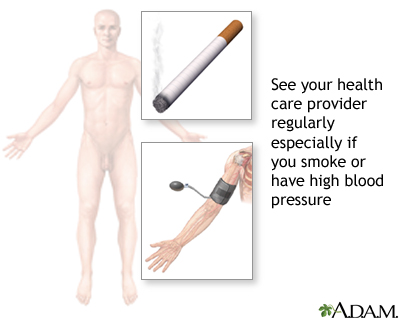Physical exam frequency
How often you need a physical exam; Health maintenance visit; Health screening; Checkup; Wellness appointment
Even if you feel fine, you should still see your health care provider for regular checkups. These visits can help you avoid problems in the future. For example, the only way to find out if you have high blood pressure is to have it checked regularly. High blood sugar and high cholesterol levels also may not have any symptoms in the early stages. A simple blood test can check for these conditions.
Information
All adults should visit their provider from time to time, even if they are healthy. The purpose of these visits is to:
- Screen for diseases
- Assess risk of future medical problems
- Encourage a healthy lifestyle
- Update vaccinations
- Maintain a relationship with a provider in case of an illness
Recommendations are based on gender and age:
- Health screening - women age 18 to 39
- Health screening - women age 40 to 64
- Health screening - women age 65 and older
- Health screening - men age 18 to 39
- Health screening - men age 40 to 64
- Health screening - men age 65 and older
Talk with your provider about how often you should have checkups.
References
Atkins D, Barton M. The periodic health examination. In: Goldman L, Schafer AI, eds. Goldman-Cecil Medicine. 26th ed. Philadelphia, PA: Elsevier; 2020:chap 12.
Review Date: 6/12/2023
Reviewed By: Jacob Berman, MD, MPH, Clinical Assistant Professor of Medicine, Division of General Internal Medicine, University of Washington School of Medicine, Seattle, WA. Also reviewed by David C. Dugdale, MD, Medical Director, Brenda Conaway, Editorial Director, and the A.D.A.M. Editorial team.








